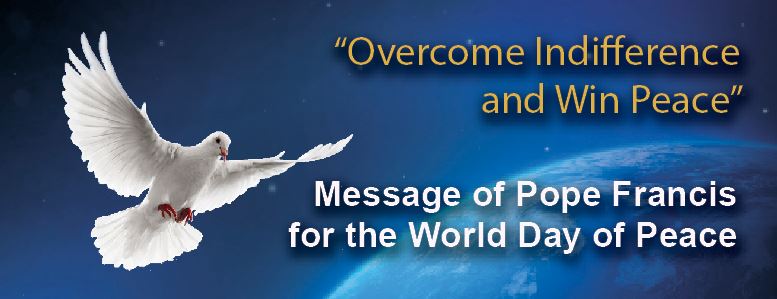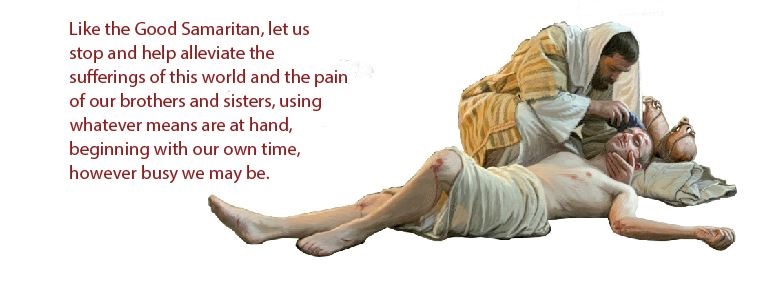
Since 1968, the Roman Catholic Church has celebrated the World Day of Peace on January 1st, Feast of Mary, Mother of God. Here are excerpts from the message written by Pope Francis for 2016; the theme for this year’s message is: “Overcome indifference and win peace”:
God is not indifferent! God cares about mankind! God does not abandon us! At the beginning of the New Year, I would like to share not only this profound conviction but also my cordial good wishes for prosperity, peace and the fulfilment of the hopes of every man and every woman, every family, people and nation throughout the world, including all Heads of State and Government and all religious leaders. We continue to trust that 2016 will see us all firmly and confidently engaged, on different levels, in the pursuit of justice and peace. Peace is both God’s gift and a human achievement. As a gift of God, it is entrusted to all men and women, who are called to attain it...
As creatures endowed with inalienable dignity, we are related to all our brothers and sisters, for whom we are responsible and with whom we act in solidarity. Lacking this relationship, we would be less human. We see, then, how indifference represents a menace to the human family. As we approach a new year, I would ask everyone to take stock of this reality, in order to overcome indifference and to win peace.
Clearly, indifference is not something new; every period of history has known people who close their hearts to the needs of others, who close their eyes to what is happening around them, who turn aside to avoid encountering other people’s problems. But in our day, indifference has ceased to be a purely personal matter and has taken on broader dimensions, producing a certain “globalization of indifference”.
The first kind of indifference in human society is indifference to God, which then leads to indifference to one’s neighbour and to the environment. This is one of the grave consequences of a false humanism and practical materialism allied to relativism and nihilism. We have come to to think that we are the source and creator of ourselves, our lives and society. We feel self-sufficient, prepared not only to find a substitute for God but to do completely without Him. As a consequence, we feel that we owe nothing to anyone but ourselves, and we claim only rights...
Indifference to our neighbour shows itself in different ways. Some people are well-informed; they listen to the radio, read the newspapers or watch television, but they do so mechanically and without engagement. They are vaguely aware of the tragedies afflicting humanity, but they have no sense of involvement or compassion. Theirs is the attitude of those who know, but keep their gaze, their thoughts and their actions focused on themselves...
In other cases, indifference shows itself in lack of concern for what is happening around us, especially if it does not touch us directly. Some people prefer not to ask questions or seek answers; they lead lives of comfort, deaf to the cry of those who suffer. Almost imperceptibly, we grow incapable of feeling compassion for others and for their problems; we have no interest in caring for them, as if their troubles were their own responsibility, and none of our business...
On both the individual and communitarian levels, indifference to one’s neighbour, born of indifference to God, finds expression in disinterest and a lack of engagement, which only help to prolong situations of injustice and grave social imbalance. These in turn can lead to conflicts or, in any event, generate a climate of dissatisfaction which risks exploding sooner or later into acts of violence and insecurity.
Indifference and lack of commitment constitute a grave dereliction of the duty whereby each of us must work in accordance with our abilities and our role in society for the promotion of the common good, and in particular for peace, which is one of mankind’s most precious goods...
Jesus taught us to be merciful like our heavenly Father (cf. Lk 6:36). In the parable of the Good Samaritan (cf. Lk 10:29-37), he condemned those who fail to help others in need, those who “pass by on the other side” (cf. Lk 10:31-32). By this example, he taught His listeners, and His disciples in particular, to stop and to help alleviate the sufferings of this world and the pain of our brothers and sisters, using whatever means are at hand, beginning with our own time, however busy we may be. Indifference often seeks excuses: observing ritual prescriptions, looking to all the things needing to be done, hiding behind hostilities and prejudices which keep us apart.
Mercy is the heart of God. It must also be the heart of the members of the one great family of His children: a heart which beats all the more strongly wherever human dignity – as a reflection of the face of God in His creatures – is in play. Jesus tells us that love for others – foreigners, the sick, prisoners, the homeless, even our enemies – is the yardstick by which God will judge our actions. Our eternal destiny depends on this...
We too, then, are called to make compassion, love, mercy and solidarity a true way of life, a rule of conduct in our relationships with one another... Solidarity is “a firm and persevering determination to commit oneself to the common good; that is to say to the good of all and of each individual, because we are all really responsible for all” (John Paul II, Encyclical Letter Sollicitudo rei socialis, 38), because compassion flows from fraternity...
In the spirit of the Jubilee of Mercy, all of us are called to realize how indifference can manifest itself in our lives and to work concretely to improve the world around us, beginning with our families, neighbours and places of employment.
Civil society is likewise called to make specific and courageous gestures of concern for their most vulnerable members, such as prisoners, migrants, the unemployed and the infirm…
I would like to make a threefold appeal to the leaders of nations: to refrain from drawing other peoples into conflicts or wars which destroy not only their material, cultural and social legacy, but also – and in the long term – their moral and spiritual integrity; to forgive or manage in a sustainable way the international debt of the poorer nations; and to adopt policies of cooperation which, instead of bowing before the dictatorship of certain ideologies, will respect the values of local populations and, in any case, not prove detrimental to the fundamental and inalienable right to life of the unborn.
I entrust these reflections, together with my best wishes for the New Year, to the intercession of the Blessed Virgin Mary, our Mother, who cares for the needs of our human family, that she may obtain from her Son Jesus, the Prince of Peace, the granting of our prayers and the blessing of our daily efforts for a fraternal and united world.
From the Vatican, December 8, 2015.
Pope Francis
